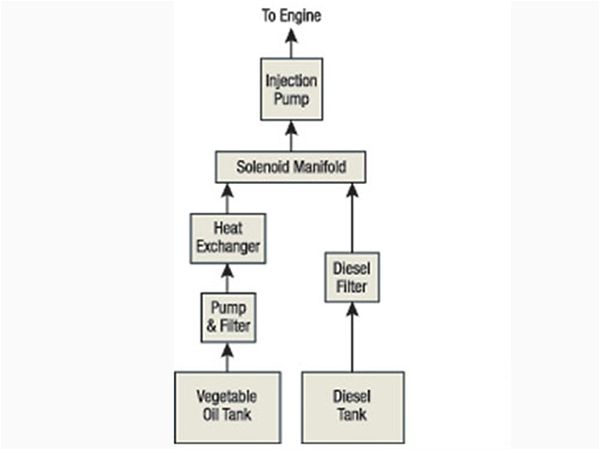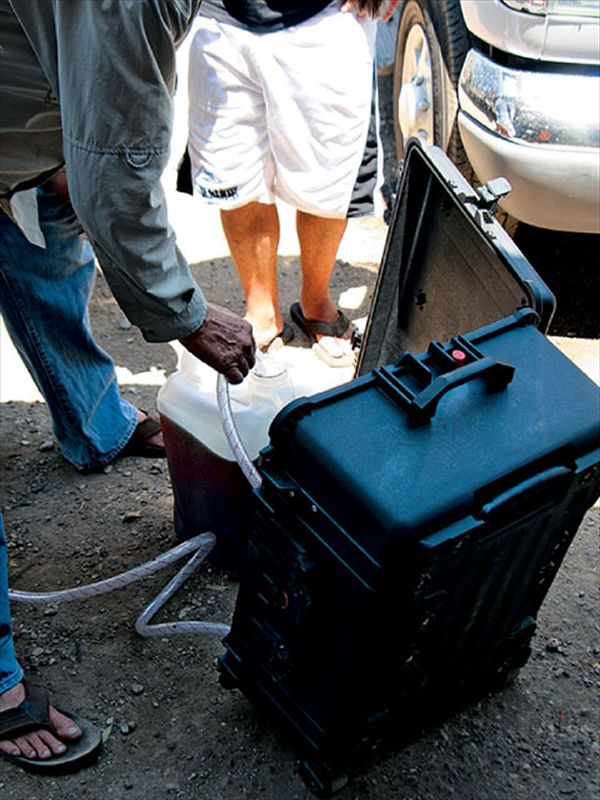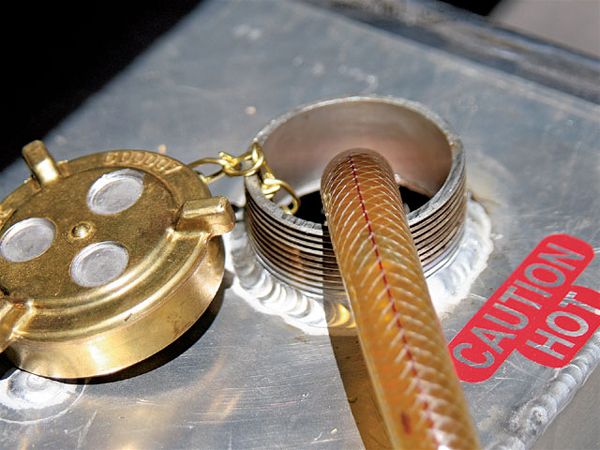
 Power to spare. This 2000 Ford Excursion demonstrates the potential energy contained in recycled vegetable oil. Fry-food first and then tires.
Power to spare. This 2000 Ford Excursion demonstrates the potential energy contained in recycled vegetable oil. Fry-food first and then tires.
Unless you've been hiding out under a rock in some foreign country, you probably know about the grassroots movement associated with fueling diesel-powered vehicles with recycled vegetable oil. SVO stands for straight vegetable oil. We're not talking about biodiesel-we're referring to oils extracted from the seeds of plants like soybeans, peanuts, and sunflowers. It's true, that trusty diesel pickup in your driveway-the one that's been costing a small fortune to operate lately-yup, it'll run on a whole assortment of different cooking oils, and the best part is; you can get this oil for free. It all started back in 1897 when Rudolf Diesel, the founding father of the diesel engine, developed a new and different version of the internal combustion engine that could run on various types of oils. Unfortunately, the idea was shelved by Diesel's business partners after suspicious circumstances led to Diesel's disappearance from the deck of a boat off the coast of France. He was never seen alive again. As the years passed, Diesel's vision got twisted into a petroleum-driven profit center that continues to grow today.
 Typical SVO System
Typical SVO System
Skeptics will tell you vegetable oil doesn't work as a fuel. Or they claim the oil will freeze up in colder climates, clogging up tanks, filters, pumps, and lines. We've even heard critics say that running oil will somehow shorten the lifespan of critical engine components. We disagree. We know of people who have driven more than 100,000 miles on vegetable oil, with no concrete evidence proving any negative effects. Furthermore, no significant studies have been conducted to this effect, nor has any major federally recognized organization having to do with fuel usage. Veggie oil as a fuel gets a bad rap because so many individuals out there have tried it without understanding all the variables involved in a fully functional conversion. Tons of homemade systems exist today that are not complete and rarely engineered for various environmental conditions we tend to expose our vehicles to while driving. The end result is a frustrated hobbyist sitting on the side of the road troubleshooting his work, or lack thereof, wondering why the car won't start.
 The Veg-n-Go consists of a durable Pelican case, a heavy-duty gear-rotor oil pump, and dual filter assemblies. To use the device, you simply wheel it up to the container and stretch out the included hoses between the waste oil drum and the fill spout of the vehicle. Next, hook up the 12-volt jumper cables to the battery and flip a switch. It's that easy. Here's a tip: leave the suction hose about 1-foot from the bottom of the drum; this will prevent nasty food matter from clogging your filter elements.
The Veg-n-Go consists of a durable Pelican case, a heavy-duty gear-rotor oil pump, and dual filter assemblies. To use the device, you simply wheel it up to the container and stretch out the included hoses between the waste oil drum and the fill spout of the vehicle. Next, hook up the 12-volt jumper cables to the battery and flip a switch. It's that easy. Here's a tip: leave the suction hose about 1-foot from the bottom of the drum; this will prevent nasty food matter from clogging your filter elements.
Vegetable oil, just like any other fuel out there, requires an engineered delivery system. With fuel prices climbing higher each day, it seems like more and more companies are popping up with one-size-fits-all conversion kits that fail to address vehicle-specific issues. Again, this leads to frustration, only now the aggravation lies with the consumer who purchased a system that wasn't designed properly. Despite what naysayers claim, we're here to tell you vegetable oil works well in most applications, but only if the delivery system addresses concerns of a thicker fuel with a tendency to start gelling at 40 degrees Fahrenheit.
Joel and Rebecca Woof, owners of Veg Powered Systems in Ojai, California, know this, and that's why they warn consumers about the plethora of companies out there that don't address these issues. "It's one thing to offer a universal conversion kit to Joe Public and it's another to do it right," Joel says. "We don't sell do-it-yourself kits. We install complete veg-oil conversions designed specifically to work with that vehicle's individual requirements." While Joel's systems are in fact tailored specifically to meet the needs of each vehicle, other systems are not. This is where a little basic understanding about the conversion process is valuable. As you might expect, Veg Powered Systems simply cannot convert everyone's ride, and the demand for such systems is only growing. So we took a few days out of the office to shadow Joel's operation, and grasp an understanding of a basic conversion. This is what we discovered.
Typical Conversion Requirements
Diesel engine
Secondary fuel tank
Secondary fuel pump
Filter assembly
Change over valve
Heat exchanger
Hose, clamps, and fittings
Electrical parts, wire, switches, and so on

Once you have a system installed on your vehicle you have to find fuel. There are many restaurants that use oil for frying food. These restaurants, in most cases, are more than happy to give away used cooking oil to customers who frequent the place. Otherwise, most restaurants pay a service to collect the waste oil and haul it off. The key is to find restaurants that change oil frequently, if not daily. More frequently changed fryer oil means less food matter in the oil, and food matter is the stuff that clogs filter media quickly. Notice the golden color of the oil flowing through the hose pictured here-this is the color of good used oil. Poor quality oil looks dark and has little particles of food suspended in it. It is best to only take the waste oil that is clear of debris-otherwise you cut down filter life substantially.

More On Veg Powered Systems
Veg Powered Systems will convert most diesel-powered vehicles on the road today. They even convert tractors, big rigs, and boats from time to time. The price for a system depends on the complexity and components necessary. For example: a newer Duramax pickup would cost $6,000 to convert start to finish. This includes a DVD with interesting facts about collecting used oil and the technology behind the system. Diesel cars such as the VW Beetle shown here also run great on vegetable oil, the only drawback with these types of vehicles being that the secondary fuel tank usually has to be located inside the trunk or storage hatch. The payback for the initial cost of a system comes rather quickly if you drive a lot of miles.
Is an SVO Conversion Legal?
Yes and no. The government currently has no way to tell whether or not a vehicle is running on recycled vegetable oil or diesel. The only noticeable difference between the two fuels while in use is the smell. Vegetable oil emits a smell similar to freshly cooked French fries. (Yum.-Ed.) Technically speaking, those who run vegetable oil without reporting it are cheating the government out of tax dollars associated with each gallon of fuel they don't purchase. However, enforcement in this area of the law is seldom uniform and usually infrequent. We've seen side-of-the-road DOT dip stations set up in heavy agriculture areas. Typically, these makeshift stations are checking for diesel pickups with transfer tanks in the bed to see if any "red-dye" or "off-road" diesel fuel exists in the factory fuel tank. However, in theory any vehicle caught running a non-taxable fuel can be cited and fined. To avoid this, we recommend checking with your local government agencies about laws governing alternative fuel use on public roads. In many cases, the state will offer forms to aid consumers in keeping track of alternative fuel use so that responsible drivers can pay road taxes on the fuel they use. For us, vegetable oil works great for adventures that take us off the beaten path, where road tax has no say in what fuel you use. Places like Baja, Mexico, and the dragstrip are among our favorite places to use it.


